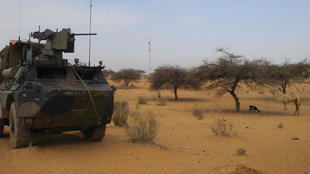A massive car bomb attack targeted France’s Barkhane force in the central Malian town of Gossi on Monday injuring several soldiers, local sources told FRANCE 24.
The attack occurred in the Kaigourou neighbourhood of Gossi in central Mali injuring several soldiers operating under France’s Operation Barkhane in Sahel, according to local sources.
Witnesses said several military helicopters could be seen heading to the area after the massive explosion to evacuate the wounded.
#Mali #Barkhane frappé ce matin par une voiture piégée dans le quartier de Kaigourou à #Gossi plusieurs blessés et importante déflagration selon sources locales // plusieurs hélicoptères dépêchés depuis #Gao selon témoin pic.twitter.com/HcsUXNKoUw
— Wassim Nasr (@SimNasr) June 21, 2021“It was a car bomb, which is rare in this region and the car bomb targeted a Barkhane patrol,” said Wassim Nasr, FRANCE 24’s terrorism expert. “From local sources, we know that debris from the car flew over three kilometres from impact, which means it was a big bomb. We also heard about gunfire exchanges between the jihadis and French forces. This was not on the spot of the explosion, but a little further north of the town, which means the confrontation of the jihadis was complex and complicated for French forces.”
The attack came days after French President Emmanuel Macron announced a reduction of France’s military operations in Africa’s Sahel region, saying France’s existing Barkhane force needs “profound transformation”.
Macron is calling for a new international force for the region.
“We can suspect” that the car-bombing and the impending French military withdrawal are “connected”, Nasr said. “The attack also comes a day after the “first speech by the head of Al-Qaeda in the Islamic Maghreb, who called for more and more attacks against French forces,” he explained.
France currently has 5,100 troops in the arid and volatile Sahel region, which stretches across Africa under the Sahara desert encompassing Burkina Faso, Chad, Mali, Mauritania and Niger.
The Sahel is seen by many Western politicians and experts as a major risk because of the growing strength of jihadist groups there, as well as its role as a crossroads for arms and people-smuggling.
“In this context of withdrawal, jihadis will put more and more pressure on French forces,” Nasr warned.
Senior IS group commander arrested
The attack came days after French forces in Mali captured a senior commander of the Islamic State in the Greater Sahara (EIGS) group.
Dadi Ould Chouaib, also known as Abou Dardar, was arrested on June 11 in the flashpoint “tri-border” region between Niger, Mali and Burkina Faso, the site of frequent attacks by jihadist groups, according to the French military.
Mali has been in turmoil since a 2012 uprising prompted mutinous soldiers to overthrow the country’s president of a decade. The power vacuum that was created ultimately led to an Islamic insurgency and a French-led war that ousted the jihadists from power in 2013. A peace agreement was signed in 2015 by three parties — the government, a coalition of groups who seek autonomy in northern Mali, and a pro-government militia.
However, the insurgents quickly regrouped in the desert and began launching frequent attacks on the Malian army and its allies fighting the insurgency. The extremists, affiliated with al-Qaida and the Islamic State militant group, have moved from the arid north to more populous central Mali since 2015 where their presence has stoked animosity and violence between ethnic groups in the area.
In the latest turmoil, Col. Assimi Goita grabbed power in August 2020 by overthrowing Mali’s democratically elected president. He eventually agreed to a transitional government led by a civilian president and prime minister but on May 24 he ousted those civilian leaders after they announced a Cabinet reshuffle.

